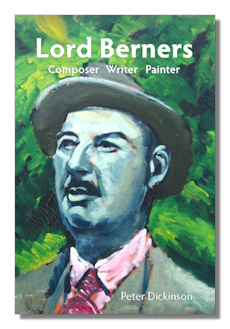
The Internet's Premier Classical Music Source
Related Links
-
Introduction
Acoustics
Ballet
Biographies
Chamber Music
Composers & Composition
Conducting
Criticism & Commentary
Discographies & CD Guides
Fiction
History
Humor
Illustrations & Photos
Instrumental
Lieder
Music Appreciation
Music Education
Music Industry
Music and the Mind
Opera
Orchestration
Reference Works
Scores
Thematic Indices
Theory & Analysis
Vocal Technique
Search Amazon
Recommended Links
Site News
 Book Review
Book Review
Lord Berners

Composer, Writer, Painter
Peter Dickinson
The Boydell Press, 2008, 2010 (paperback)
Acid-free paper. 214 pages.
58 colored illustrations of paintings
Nine Appendices
Catalogues of musical works, discography, published writings and paintings
Bibliography; index of Berners' works
ISBN-10: 1843835517
ISBN-13: 978-1843835516
Lord Berners (1883-1950) was born Gerald Hugh Tyrwhitt and became the 14th Baron Berners in 1918, inheriting title and fortune from an uncle. The present volume is not a biography, but includes a great deal of biographical, as well as critical material. Following a substantial introduction – about his life, work and quirky personality – and then a summary of critical responses to Berners's work, the bulk of the volume consists of interviews of people who knew Berners, including Sir Frederick Ashton, the choreographer; Lord David Cecil, the literary critic and biographer, who was descended from the Cecils who served Queens Elizabeth and Victoria; and the composers Gavin Bryars and Sir Richard Rodney Bennett, to mention only the most widely known.
As the title indicates, Berners was known for his accomplishments in three separate creative categories and he was more than an amateur at each of them. Consensus would have it that his greatest importance was as a composer, and that was his own priority. (However, each activity helped him with the others.) Not as well-known today as in his time, he was a significant figure in the musical landscape of his time and place. No less an authority than Stravinsky (who knew him in Rome when Tyrwhitt was serving as diplomat) maintained that he was the best composer from England at the time; not "an English composer," though; his music was modernist, even avant-garde, especially his earlier work, not at all like that of his contemporaries Vaughan Williams or Holst. Diaghilev commissioned and performed his ballets. Some comparisons are made to other British composers of his time.
As an artist, Berners was praised by the eminent critic Clive Bell, in a publication accompanying an exhibit of Berners' work. His paintings are nicely produced in color in this volume. He was influenced by Corot, especially by the latter's early work, and collected paintings by Corot. Astoundingly, he was able to acquire these for as little as thirty pounds.
As a writer, in addition to stories, novels and poetry, meant to amuse rather than express profundities, Berners wrote two autobiographical books – about his childhood and about his years at Eton. The latter, A Distant Prospect, is considered by those who knew that famous school to be an accurate portrait, and by those with literary opinions to be his best book. After seeing this judgment repeated more than once or twice, I made a trip to the library and read it myself; it is quite short, and well-written with some delightful turns of phrase, for instance: "There was one member of the group, a boy called Johnson, who was not so bright as the others. In fact, he was not bright at all. The only features that redeemed him from being an insufferable bore were that he was quite nice-looking in rather a bovine way and that he was appreciative of other people's jokes when he could understand them." Berners' poems, best appreciated when read aloud, includes some similar zingers. Even about himself he could write an Auto-Epitaph: "Here lies Lord Berners/One of the learners. His great love of learning/May earn him a burning/But praise to the Lord/He seldom was bored." I was surprised occasionally to come across a word or two which in spite of their Anglo-Saxon origin, I never associated with British speakers.
This volume is handsomely produced, as is characteristic of books issued by Boydell. An unusual feature is the placement of marginal side-notes by Dickinson. These show considerable learning and concern for what the reader might want to know about persons mentioned and various other details.
The interest of this book includes not only a portrait of the varied aspects of an unusual man but insider views of the elite society in which Lord Berners lived.
Recommended.
Copyright © 2016, R. James Tobin


















